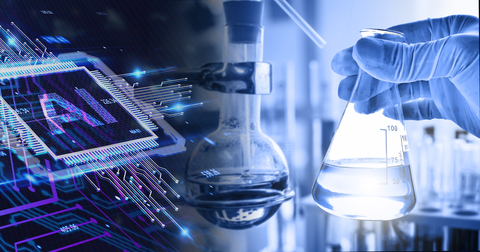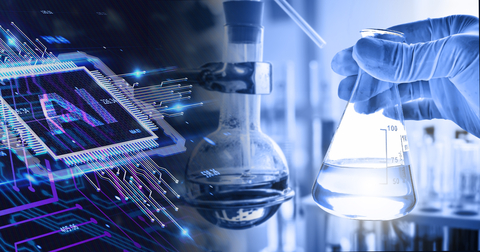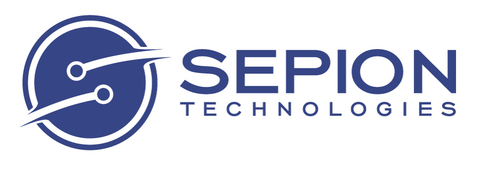ALAMEDA, Calif.--(BUSINESS WIRE)--Sepion Technologies, a leading developer of nanoengineered separator coatings and liquid electrolytes for faster charging, lower-cost, and energy-dense lithium-ion and lithium-metal batteries, has deployed its proprietary materials discovery platform powered by Artificial Intelligence (AI) in developing a non-flammable liquid electrolyte that can reduce the risk and severity of fires in electric vehicle (EV) batteries.
Sepion’s researchers subjected the newly discovered liquid electrolyte to flammability testing against standard commercial lithium-ion battery electrolytes, demonstrating its efficacy and safety features with a flash point exceeding 70°C and self-extinguishing time (SET) that is 25 times better than commercial lithium-ion battery electrolytes. See the electrolyte flammability testing video here: https://youtu.be/9DdAM5RRU_w
“Safety is at the forefront when customers seek new, better-performing battery technologies for e-mobility applications. Making a non-flammable electrolyte capable of sustaining 3C fast charging with a lithium-metal anode is a significant milestone for Sepion and the industry. With this breakthrough, we move closer to unlocking a 40 percent increase in range with rapid charging capabilities for the next generation of EVs,” explained Sepion Technologies’ VP of Business Development, Salil Soman.
Searching for an optimal electrolyte solution that meets several contrasting performance metrics requires sifting through and assessing millions of different material properties and their combinations. Sepion’s advanced AI platform revolutionizes the material discovery process by identifying up to 10 million formulations in just one week – rapidly examining extensive libraries of materials from component categories such as salts, solvents, and additives. This is not possible using traditional research techniques. With the in-silico power of AI, Sepion’s researchers and scientists can quickly narrow their focus, saving time and utilizing the lab resources strictly for ex-situ and in-situ screening of the most favorable candidate formulations.
The process starts with classical and quantum-mechanical modeling (DFT) of component properties at the molecular level, followed by molecular dynamics simulations (MD) and AI tools that predict properties, including flash point and viscosity. After selecting the most promising material candidates, Sepion researchers formulate electrolytes and polymers for further ex-situ screening and in-cell evaluations. This AI-assisted process can accomplish years’ worth of work in just weeks or months.
“Sepion’s AI-based materials discovery approach accelerates R&D, leading to the discovery of groundbreaking solutions like this non-flammable electrolyte, addressing and reducing critical fire risks in lithium batteries,” noted Sepion’s CTO Brian Sisk, PhD. “Our streamlined research process is closed-loop, including swift identification of high-value compounds, allowing our scientists to synthesize, formulate, and test battery electrolytes. We feed this data back into the machine-learning algorithms for iterative improvements. This continuous learning process, which includes feedback from data validation in pouch cells, has demonstrated performance improvements much faster than possible with traditional experimentation. We are excited about the opportunities that exist at the intersection of physics and machine learning.”
The computational toolset delivers advanced capabilities well beyond electrolyte development, also encompassing optimization of nanoengineered polymer coatings for separators, thereby facilitating revolutionary advancements in battery performance by discovering and developing novel materials.
Prioritizing safety in battery technology, Sepion has recently achieved UN/DOT38.3 certification for their energy-dense lithium-metal pouch cells, showcasing the critical role of innovations such as this self-extinguishing electrolyte in advancing the safety standards of lithium batteries.
Sepion is committed to bringing this groundbreaking technology to market with its current commercial partners and exploring new collaborations with global auto manufacturers and stakeholders in the energy storage sector. As a leader in battery materials innovation, the company continues to advance technological frontiers dedicated to fostering a safer and more sustainable future.
To learn more about Sepion Technologies, visit SepionTechnologies.com and connect with us on LinkedIn and X (Twitter).
About Sepion Technologies
Headquartered in Alameda, Calif., Sepion’s core innovations – centered on soft separator coatings and liquid electrolytes – are designed for manufacturing, enabling incumbent lithium-ion battery manufacturers to utilize their existing infrastructure to deliver a step change in performance with minimal switching costs. Sepion was founded on research conducted at the Molecular Foundry at Lawrence Berkeley National Lab and spun out with the support of the prestigious Cyclotron Road energy technology incubator, now part of the Activate organization.
Sepion’s roots extend to the US Department of Energy’s innovation hub, the Joint Center for Energy Storage Research (JCESR), and awards from ARPA-E, Advanced Manufacturing Office, California Energy Commission, and New Energy Nexus who have amplified their growth. Sepion is on a mission to sustainably power humankind with breakthrough battery products.




